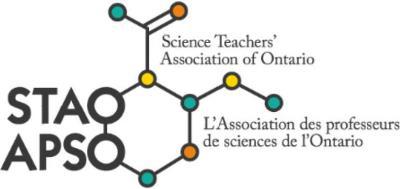2022 Ontario Elementary Science and Technology Curriculum
Lesson plans for each grade, long range plans, coding and webinars for teachers
The resources found on this website have been created to assist Ontario teachers with the implementation of the revised Elementary Science and Technology Curriculum 2022. The resources have all been created by Ontario Certified Teachers to provide examples of best practices in elementary science and technology. This project has been a collaboration between the Science Teachers’ Association of Ontario (STAO), The Ontario Council for Technology Education (OCTE) and The Association for Computer Science Educators (ACSE). Funding for these resources was provided by the Ontario Ministry of Education.

Long Range Plans – Introduction to Resources
These long range plans outline a year-long set of activities for teaching and learning science and technology. Long range plans are living documents that are revised as educators become increasingly aware of the abilities, strengths, needs, and interests of their students. There are two models for these long range plans to provide teachers with a variety of opportunities to create appropriate learning experiences for their students. Curriculum resources for each grade have also been created to support these long range plans.
Primary
Grade 1 LRP Model 1
Grade 1 LRP Model 2
Grade 2 LRP Model 1
Grade 2 LRP Model 2
Grade 3 LRP Model 1
Grade 3 LRP Model 2
Junior
Grade 4 LRP Model 1
Grade 4 LRP Model 2
Grade 5 LRP Model 1
Grade 5 LRP Model 2
Grade 6 LRP Model 1
Grade 6 LRP Model 2
Intermediate
Grade 7 LRP Model 1
Grade 7 LRP Model 2
Grade 8 LRP Model 1
Grade 8 LRP Model 2
Curriculum Resources
Curriculum resources for each grade have been developed to highlight the key areas in the revised Elementary Science and Technology Curriculum 2022. These learning experiences have been designed to provide educators with content-specific lessons and activities that cover approximately 1-3 class periods. All activities include curriculum expectations, learning goals, success criteria, teaching and learning activities, resources and materials, assessment opportunities, and important equity, diversity, and inclusivity considerations to support all learners. Each of the earning experiences is tied to one of the two models in the long range plans found on this website.
In these activities, there is a strong focus on Strand A as the overarching strand that focuses on the foundational STEM skills and connections that will enable students to investigate concepts and integrate knowledge from each of the other strands and make practical connections between science and technology and other subject areas. In Strands B through E, students integrate Strand A expectations as they develop their understanding of strand-specific concepts, investigate phenomena, and make meaningful connections to the real world.
Primary
Grade 1: How Do Living Things Adapt to Seasonal Changes
Grade 1: Animal Shelters
Grade 2: Where Does Water Go?
Grade 3: Growing a Garden Salad
Grade 3: Strong and Stable Structures
Junior
Grade 4: Pollinators
Grade 4: Sound and Light with a Purpose
Grade 5: Conservation of Energy
Grade 5: Structures and Mechanisms
Grade 6: Flight Machines
Grade 6: Biodiversity
Intermediate
Grade 7: Human Impact on the Environment
Grade 7: Sustainable Development Goals
Grade 7: Coding Changes of State
Grade 7: Structural Strength and Stability
Grade 8: Innovative Irrigation
Grade 8: Water – Environmental and Social Impacts
Coding Resource
This resource will support Ontario teachers to develop their professional knowledge around teaching computational thinking and coding.
Computational Thinking (CT) and Coding Instruction – A Teacher’s Guide
Webinars
As support for these long range plans and curriculum resources, a series of professional development webinars were presented in November. These webinars were recorded and are now available. The goal of these webinars is to increase teachers’ understanding and confidence in teaching the revised Science and Technology curriculum, including cross-curricular instruction and culturally responsive and relevant pedagogy.
Please note that the presentation files will be available for download in January 2023.


